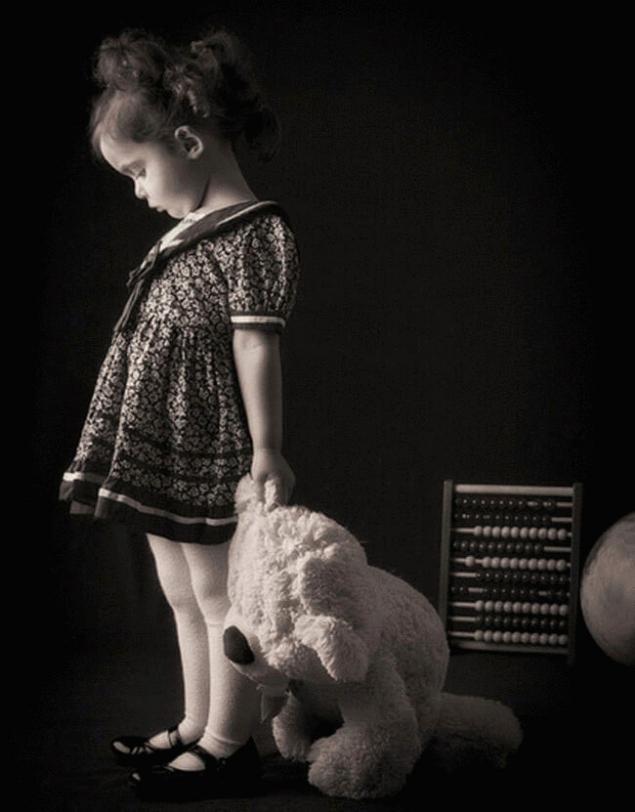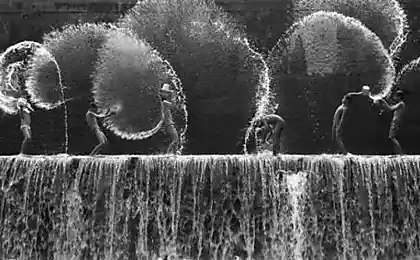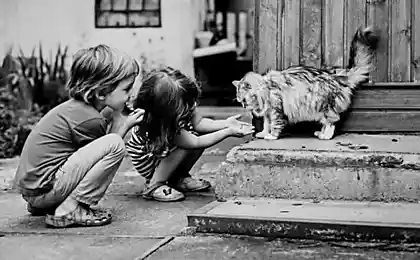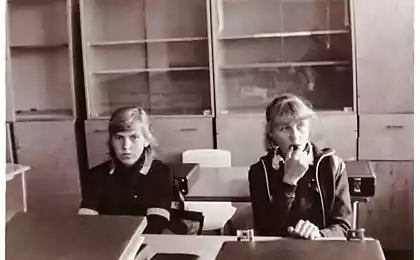560
5 reasons to STOP saying GOOD to their children
Praise is a completely different story, and here's why.
Alfie Cohen is considered one of the leading experts in progressive education, he lectures to universities, speak at professional conferences and parent groups. In his books Alfie Cohen criticizes many traditional aspects of parenting, education, and modern American society as a whole, based in each case on sociological research.
Many of his assertions are not undisputed and original cause resistance, but Alfie Cohen strongly relies on scientific researches and analyzes facts.

photo © Bill Gekas
In the original "Good Job" (idiom) — Good job, well done.
Take a walk through the Playground, go to school or poprisutstvuet on the birthday child and you can be absolutely sure that is repeatedly heard in one form or another: "well Done!". Even very young, when they only clap their hands, praise: "well Done! Well clap". Many of us tell children "Good job!" so many times that it is word-parasite.
Many books and articles written on counteraction to violence and the refusal of the punishments, floggings and isolation. Others will ask us to think again, before you can use stickers and delicious food as bribery. And you will be hard pressed to find anyone who will argue against what is euphemistically called positive reinforcement.
To avoid misunderstandings, let's just mention that in this article, we in any case are not questioning the importance of support and encouragement for the children, and the need to love them, to hug them and help them to find a stable positive self-esteem.
However, praise is a completely different story, and here's why.
1. The manipulation of children
Suppose you praise the two-year kid because he does not shed soup, or five years for what he takes away their toys. Who wins? Maybe the phrase "well Done!" is rather meant for our convenience than due to the emotional needs of children?
Rita Di Vries (Rheta DeVries), Professor of education at the University of Northern Iowa, calls it "sweetened." It is very similar. Such awards, however, and punishment, are a way to make the children to meet our expectations. This tactic can be effective for obtaining a specific result (at least at the time), but she is very different from working with children, for example, involving them in the conversation about what responsibilities in the classroom or in the family, or how our actions (what have we done, or what didn't) can affect other people.
This approach is not only more respectful but more likely to help children learn to think.
The reason that praise can have a short-term effect is that children crave our approval. But we have a responsibility not to use this dependence for their own convenience. "Well done!", this is exactly the phrase that makes our lives easier, but we use the dependence of our children. Children also feel that this is manipulation, although I can't explain why.
2. The creation of "our addiction"
Of course, not every compliment means controlling child behavior. Sometimes we compliment kids just because I sincerely rejoice in their actions. However, in this case, we need to be very careful. Instead of strengthening the child's sense of self-esteem, praise can make it even more dependent on us. The more often we say: "I like the way you ..." or "You did well ...", the less they learn to form their own judgments, and the more you get used to rely on our evaluations, our opinions about what is good and what is bad. It encourages them to measure their own worth by the extent of our smiles and approvals.
Researcher Mary Budd Rowe (Mary Budd Rowe) from the University of Florida, found that children whose teachers lavishly praised, were less confident in their answers and are more likely to use interrogative intonations in their responses ("um, seven?"). They tend to quickly depart from their opinions when adults don't agree with them. They were less likely to perseverance in solving complex tasks, and willingness to share their opinions with other students.
In short, "well Done!" does not strengthen, but in the end, even increases their anxiety. This can result in a vicious circle: the more thickly we spread the praise, the more kids will need so we praise them even more. Sorry, but some of these children will become adults who will also need someone to Pat them on the head and told them that they did everything right. Of course, this is not what we would like for their daughters and sons.
3. Theft of baby fun
But besides the danger of addiction, there is another question: the child has the right to enjoy their own accomplishments, to feel pride in what he has learned to do. Besides, he deserves the right to choose what feelings he experienced. Because every time when we say "well Done!", we, thus, say to the child that he must feel.
Of course, there are times when our evaluations are appropriate and guidance is needed, especially toddlers and preschoolers... But a constant stream of value judgments is neither useful nor necessary for the development of children. Sorry, we can't understand what "well Done!" is exactly the same rating as "Very bad!". Feature of a positive judgment is not that it is positive, and the fact that it is judgment. And people, including children, don't like being judged.
I cherish the moments when my daughter something to do for the first time, or she did something better than before. But I try to resist the reflex of "well Done", because I don't want to dilute her joy. I want her to share the joy with me, not looking at me in anticipation of the verdict. I want she exclaimed, "I did it!" (she often does), not asked hesitantly to me, "That good?".
4. Loss of interest
The phrase "Good painting!" may get children who will draw only as long as we watch and praise. And, warns Lilian Katz, one of the country's leading experts on preschool education, "if more attention to the activities of the child are terminated, many children cease to do it." Indeed, an impressive amount of research shows that the more we reward people for what they do, the more they lose interest in what they have to do to get the reward. And now we're not talking about reading, writing, thinking, or creativity, we're talking about getting "candy", be it ice cream, a sticker or "Good job!"
The alarming results obtained in the study conducted by Joan Grusec at the University of Toronto: small children are often praised for their generosity, in everyday life has been less generous than other children. Every time they heard "Good sharing" or "I'm so proud of you," they became less interested to share or help. Generosity was perceived by them not as an independent value and as a way to get the desired reaction of the adult. It has become a means to achieve the goal.
Whether praise motivates children? Of course! It motivates children ... to receive praise. And, alas, often at the expense of commitment to the actions that cause it..
5. Reduction achievements
It would seem, is enough that "Good job!" can undermine independence, pleasure and interest, but this can disturb the child to do his daily work. Researchers found that children who were praised for creative tasks tend to stumble on the following and do not perform it, unlike the children who are not praised from the beginning.
Why is this happening? Partly because praise puts pressure on the child to "be good", which prevents the execution of the task. Because of their interest in these activities declined. They are not inclined to take risks — a necessary condition for creativity because you begin to worry about maintaining the already received positive reviews .
Thus, the "well Done!" a rudiment of the psychology that drove the whole life of man to the visible and measurable behavior. Unfortunately, this approach ignores the thoughts, feelings, and values that underlie behavior. For example, a child can share a sandwich with a friend for a variety of reasons: because he wants to be praised, or to ensure that the full. Praising for this act, we ignore the diversity of its motivations. The worst thing is that it actually reinforces less desirable motivations that encourage children to seek praise.
When you start to see praise for what it is and its impact, these little evaluative eruptions adults start giving you the same effect as scraping nails on a blackboard. You begin rooting for the child, and to give his teachers and parents to experience a taste of their own treacle, turn around to them and say the same sugary voice: "Good praise!".
However, this habit is not so easy to get rid of. In the beginning it may seem strange, but ceasing praise, you will feel dry and stiff, or that you constantly stop myself from something. But soon you will notice that begin to praise more just because it you have this need, not because the kids want to hear this from you. Whenever you make sure that this is true, you will need to review their actions.
It's really like children, so it is in absolute support and unconditional love. It's not just a contrast to the praise — it's the opposite. "Well done!" — this is just a Convention which means we offer attention, appreciation and acceptance instead of striving to guess and confirm our expectations.
Please note, this view is considerably different from the criticism that often sounds and accuses us that we are very much and easy to hand out to children approval. Such recommendations are a call for us to become more generous with praise and to demand from children that they "deserve". But the real problem is not that children are counting whole days to praise for everything they do. The problem is that provoke us to ensure that we cut corners and manipulated the children with rewards instead of explaining and helping to develop necessary skills.
What's the alternative? All depends on the situation, but regardless of what we decide to say, you need it to be associated with this affection and love, because they are children, not because they did something. When there is unconditional support, "well Done!" is not required, when it is not, "well Done!" can not help.
If we use praise as a way to stop a bad behavior of the child, it is unlikely that this effect will be lasting. And even when it works, we can safely say that this is the child "behaves" or "praise leads" of the child. Alternatively it should work with the child to ascertain the reasons for his behavior. We might have to reconsider its own requirements, and not just to find a way to make the kids listen. (Is the praise "well Done!", that will make four-year-old to sit quietly for the whole class or a family dinner, perhaps ought to ask ourselves: is it reasonable to expect such behavior from a child).
We also need to include children in the decision-making process. If a child is doing something that disturbs others, you should sit down with him and ask, "what do you think we should do to solve this problem?" This is likely to be more effective than bribery or threats. This will also help your child learn to solve problems and show what thoughts and feelings are important. Of course, this process requires time, talent, patience and courage. When the child's behavior is consistent with our understanding, we briefly throw him, "well Done!", and wondered why the strategy of "do that" is much more popular than "work with".
What can we say to the child when he does something really impressive? We will consider three possible options:
Not to say anything. Some believe that good action must necessarily be "supported", because deep down or subconsciously they believe that it was an accident. If children initially contains evil, then really, they need an artificial reason to be good, namely verbal reward. But if such cynicism is not justified, and many studies show that this is so, then the praise is not necessary.
Say what you see. Simple non-judgmental statement ("You wear shoes" or even "You did it") will show the child that you noticed. It will also allow him to be proud of what he did. In other cases, it may make sense for a more detailed description of what he saw. If your child draws a picture, you can give him unbiased feedback about what you see: "These mountains are huge!", "I'm sure you used a lot of purple paint!"
When the child showed concern or generosity, you can gently draw his attention to the impact his actions had on another person : "Look at Abigail's face! Now she looks very happy when you shared with her!" This is completely different from praise, where the emphasis is on your relationship to the act.
Less conversation, more to ask. It's even better than the description of what he saw. Why not ask your child what he likes in his picture the most, instead of to tell about what part of his drawing impressed you the most? Ask "What part of the picture was the most difficult?" or "How did you know what size you want to draw feet?" So you is likely to strengthen his interest in drawing. The Phrase "Well Done!", as we have seen, can have the opposite effect.
Of course, this does not mean that all compliments, all thanks, all expressions of admiration harmful. Not at all, but should be aware of our motives when we say certain words (sincere expression of enthusiasm are preferable to the desire to manipulate future behavior of the child), and their possible consequences...
Help child our responses to feel control over his life, or he will constantly refer to us in search of support? Do they help him to get more involved in life, be more active and independent, or make his life into something that you just want to pass, getting pats on the head.
Thus, the question is not memorizing a new script of our actions is much more important to provide a long-term goal of our children and to observe the effect of the words we speak. The bad news is that the use of positive reinforcement, in fact, is not so positive. And the good news is that you no longer need to evaluate their children, to encourage them.published
An abridged version of this article was published in the magazine "Parents magazine" in may 2000 with the title "Pitfalls of Praise".
P. S. And remember, just changing your mind — together we change the world! ©
Join us in Facebook , Vkontakte, Odnoklassniki
Source: xn--80aim3aeec.xn--p1ai/publ/rekomenduemye/ehlfi_koehn_pjat_prichin_perestat_govorit_quot_molodec_quot/2-1-0-23
Alfie Cohen is considered one of the leading experts in progressive education, he lectures to universities, speak at professional conferences and parent groups. In his books Alfie Cohen criticizes many traditional aspects of parenting, education, and modern American society as a whole, based in each case on sociological research.
Many of his assertions are not undisputed and original cause resistance, but Alfie Cohen strongly relies on scientific researches and analyzes facts.

photo © Bill Gekas
In the original "Good Job" (idiom) — Good job, well done.
Take a walk through the Playground, go to school or poprisutstvuet on the birthday child and you can be absolutely sure that is repeatedly heard in one form or another: "well Done!". Even very young, when they only clap their hands, praise: "well Done! Well clap". Many of us tell children "Good job!" so many times that it is word-parasite.
Many books and articles written on counteraction to violence and the refusal of the punishments, floggings and isolation. Others will ask us to think again, before you can use stickers and delicious food as bribery. And you will be hard pressed to find anyone who will argue against what is euphemistically called positive reinforcement.
To avoid misunderstandings, let's just mention that in this article, we in any case are not questioning the importance of support and encouragement for the children, and the need to love them, to hug them and help them to find a stable positive self-esteem.
However, praise is a completely different story, and here's why.
1. The manipulation of children
Suppose you praise the two-year kid because he does not shed soup, or five years for what he takes away their toys. Who wins? Maybe the phrase "well Done!" is rather meant for our convenience than due to the emotional needs of children?
Rita Di Vries (Rheta DeVries), Professor of education at the University of Northern Iowa, calls it "sweetened." It is very similar. Such awards, however, and punishment, are a way to make the children to meet our expectations. This tactic can be effective for obtaining a specific result (at least at the time), but she is very different from working with children, for example, involving them in the conversation about what responsibilities in the classroom or in the family, or how our actions (what have we done, or what didn't) can affect other people.
This approach is not only more respectful but more likely to help children learn to think.
The reason that praise can have a short-term effect is that children crave our approval. But we have a responsibility not to use this dependence for their own convenience. "Well done!", this is exactly the phrase that makes our lives easier, but we use the dependence of our children. Children also feel that this is manipulation, although I can't explain why.
2. The creation of "our addiction"
Of course, not every compliment means controlling child behavior. Sometimes we compliment kids just because I sincerely rejoice in their actions. However, in this case, we need to be very careful. Instead of strengthening the child's sense of self-esteem, praise can make it even more dependent on us. The more often we say: "I like the way you ..." or "You did well ...", the less they learn to form their own judgments, and the more you get used to rely on our evaluations, our opinions about what is good and what is bad. It encourages them to measure their own worth by the extent of our smiles and approvals.
Researcher Mary Budd Rowe (Mary Budd Rowe) from the University of Florida, found that children whose teachers lavishly praised, were less confident in their answers and are more likely to use interrogative intonations in their responses ("um, seven?"). They tend to quickly depart from their opinions when adults don't agree with them. They were less likely to perseverance in solving complex tasks, and willingness to share their opinions with other students.
In short, "well Done!" does not strengthen, but in the end, even increases their anxiety. This can result in a vicious circle: the more thickly we spread the praise, the more kids will need so we praise them even more. Sorry, but some of these children will become adults who will also need someone to Pat them on the head and told them that they did everything right. Of course, this is not what we would like for their daughters and sons.
3. Theft of baby fun
But besides the danger of addiction, there is another question: the child has the right to enjoy their own accomplishments, to feel pride in what he has learned to do. Besides, he deserves the right to choose what feelings he experienced. Because every time when we say "well Done!", we, thus, say to the child that he must feel.
Of course, there are times when our evaluations are appropriate and guidance is needed, especially toddlers and preschoolers... But a constant stream of value judgments is neither useful nor necessary for the development of children. Sorry, we can't understand what "well Done!" is exactly the same rating as "Very bad!". Feature of a positive judgment is not that it is positive, and the fact that it is judgment. And people, including children, don't like being judged.
I cherish the moments when my daughter something to do for the first time, or she did something better than before. But I try to resist the reflex of "well Done", because I don't want to dilute her joy. I want her to share the joy with me, not looking at me in anticipation of the verdict. I want she exclaimed, "I did it!" (she often does), not asked hesitantly to me, "That good?".
4. Loss of interest
The phrase "Good painting!" may get children who will draw only as long as we watch and praise. And, warns Lilian Katz, one of the country's leading experts on preschool education, "if more attention to the activities of the child are terminated, many children cease to do it." Indeed, an impressive amount of research shows that the more we reward people for what they do, the more they lose interest in what they have to do to get the reward. And now we're not talking about reading, writing, thinking, or creativity, we're talking about getting "candy", be it ice cream, a sticker or "Good job!"
The alarming results obtained in the study conducted by Joan Grusec at the University of Toronto: small children are often praised for their generosity, in everyday life has been less generous than other children. Every time they heard "Good sharing" or "I'm so proud of you," they became less interested to share or help. Generosity was perceived by them not as an independent value and as a way to get the desired reaction of the adult. It has become a means to achieve the goal.
Whether praise motivates children? Of course! It motivates children ... to receive praise. And, alas, often at the expense of commitment to the actions that cause it..
5. Reduction achievements
It would seem, is enough that "Good job!" can undermine independence, pleasure and interest, but this can disturb the child to do his daily work. Researchers found that children who were praised for creative tasks tend to stumble on the following and do not perform it, unlike the children who are not praised from the beginning.
Why is this happening? Partly because praise puts pressure on the child to "be good", which prevents the execution of the task. Because of their interest in these activities declined. They are not inclined to take risks — a necessary condition for creativity because you begin to worry about maintaining the already received positive reviews .
Thus, the "well Done!" a rudiment of the psychology that drove the whole life of man to the visible and measurable behavior. Unfortunately, this approach ignores the thoughts, feelings, and values that underlie behavior. For example, a child can share a sandwich with a friend for a variety of reasons: because he wants to be praised, or to ensure that the full. Praising for this act, we ignore the diversity of its motivations. The worst thing is that it actually reinforces less desirable motivations that encourage children to seek praise.
When you start to see praise for what it is and its impact, these little evaluative eruptions adults start giving you the same effect as scraping nails on a blackboard. You begin rooting for the child, and to give his teachers and parents to experience a taste of their own treacle, turn around to them and say the same sugary voice: "Good praise!".
However, this habit is not so easy to get rid of. In the beginning it may seem strange, but ceasing praise, you will feel dry and stiff, or that you constantly stop myself from something. But soon you will notice that begin to praise more just because it you have this need, not because the kids want to hear this from you. Whenever you make sure that this is true, you will need to review their actions.
It's really like children, so it is in absolute support and unconditional love. It's not just a contrast to the praise — it's the opposite. "Well done!" — this is just a Convention which means we offer attention, appreciation and acceptance instead of striving to guess and confirm our expectations.
Please note, this view is considerably different from the criticism that often sounds and accuses us that we are very much and easy to hand out to children approval. Such recommendations are a call for us to become more generous with praise and to demand from children that they "deserve". But the real problem is not that children are counting whole days to praise for everything they do. The problem is that provoke us to ensure that we cut corners and manipulated the children with rewards instead of explaining and helping to develop necessary skills.
What's the alternative? All depends on the situation, but regardless of what we decide to say, you need it to be associated with this affection and love, because they are children, not because they did something. When there is unconditional support, "well Done!" is not required, when it is not, "well Done!" can not help.
If we use praise as a way to stop a bad behavior of the child, it is unlikely that this effect will be lasting. And even when it works, we can safely say that this is the child "behaves" or "praise leads" of the child. Alternatively it should work with the child to ascertain the reasons for his behavior. We might have to reconsider its own requirements, and not just to find a way to make the kids listen. (Is the praise "well Done!", that will make four-year-old to sit quietly for the whole class or a family dinner, perhaps ought to ask ourselves: is it reasonable to expect such behavior from a child).
We also need to include children in the decision-making process. If a child is doing something that disturbs others, you should sit down with him and ask, "what do you think we should do to solve this problem?" This is likely to be more effective than bribery or threats. This will also help your child learn to solve problems and show what thoughts and feelings are important. Of course, this process requires time, talent, patience and courage. When the child's behavior is consistent with our understanding, we briefly throw him, "well Done!", and wondered why the strategy of "do that" is much more popular than "work with".
What can we say to the child when he does something really impressive? We will consider three possible options:
Not to say anything. Some believe that good action must necessarily be "supported", because deep down or subconsciously they believe that it was an accident. If children initially contains evil, then really, they need an artificial reason to be good, namely verbal reward. But if such cynicism is not justified, and many studies show that this is so, then the praise is not necessary.
Say what you see. Simple non-judgmental statement ("You wear shoes" or even "You did it") will show the child that you noticed. It will also allow him to be proud of what he did. In other cases, it may make sense for a more detailed description of what he saw. If your child draws a picture, you can give him unbiased feedback about what you see: "These mountains are huge!", "I'm sure you used a lot of purple paint!"
When the child showed concern or generosity, you can gently draw his attention to the impact his actions had on another person : "Look at Abigail's face! Now she looks very happy when you shared with her!" This is completely different from praise, where the emphasis is on your relationship to the act.
Less conversation, more to ask. It's even better than the description of what he saw. Why not ask your child what he likes in his picture the most, instead of to tell about what part of his drawing impressed you the most? Ask "What part of the picture was the most difficult?" or "How did you know what size you want to draw feet?" So you is likely to strengthen his interest in drawing. The Phrase "Well Done!", as we have seen, can have the opposite effect.
Of course, this does not mean that all compliments, all thanks, all expressions of admiration harmful. Not at all, but should be aware of our motives when we say certain words (sincere expression of enthusiasm are preferable to the desire to manipulate future behavior of the child), and their possible consequences...
Help child our responses to feel control over his life, or he will constantly refer to us in search of support? Do they help him to get more involved in life, be more active and independent, or make his life into something that you just want to pass, getting pats on the head.
Thus, the question is not memorizing a new script of our actions is much more important to provide a long-term goal of our children and to observe the effect of the words we speak. The bad news is that the use of positive reinforcement, in fact, is not so positive. And the good news is that you no longer need to evaluate their children, to encourage them.published
An abridged version of this article was published in the magazine "Parents magazine" in may 2000 with the title "Pitfalls of Praise".
P. S. And remember, just changing your mind — together we change the world! ©
Join us in Facebook , Vkontakte, Odnoklassniki
Source: xn--80aim3aeec.xn--p1ai/publ/rekomenduemye/ehlfi_koehn_pjat_prichin_perestat_govorit_quot_molodec_quot/2-1-0-23
Burdock root — the food of centenarians
The psychology of protest Or a trap for personal development























